Frequent academic disruptions are hurting students' future

We are concerned about the disruption of academic activities in a number of crisis-hit educational institutions in Dhaka. Among them are five colleges embroiled in senseless violence last week, leading to the suspension of their classes and affecting the education of at least 40,000 students. The alarming frequency of such incidents since the ouster of the Awami League government deals a blow to the dream of building a robust academic environment in line with the spirit of the uprising. For a sector already plagued by systemic challenges, this is exacerbating its vulnerabilities.
The five institutions now facing disruptions are Government Shaheed Suhrawardy College and Kabi Nazrul Government College (both affiliated with Dhaka University), as well as Dr. Mahbubur Rahman Mollah College (DMRC), Dhaka National Medical College Hospital (DNMCH), and St. Gregory High School and College. According to a report by this daily, in addition to regular classes, their exams have also been halted. Among them, DMRC suffered heavy losses as it was the epicentre of the violence. The involvement of two of its affiliates also prompted Dhaka University to postpone final exams for first- and fourth-year students in all seven of its affiliated colleges, taking the number of institutions affected by one cycle of violence to 10.
All this apparently began over alleged medical negligence at the DNMCH, where a DMRC student died, resulting in clashes that spread to nearby colleges. The mindless mayhem witnessed on November 24 and 25 in particular was quite disturbing. Around the same time, we also saw clashes between students of the Bangladesh University of Textiles (BUTEX) and Dhaka Polytechnic Institute, as well as between Dhaka College and City College. The violent sit-ins and protests by students of Government Titumir College and other DU-affiliated colleges, demanding university status for their institutions, also align with the pattern of disruptive mobilisations that have been taking place since August 5.
While these expressions of discontent are not unthinkable in a post-conflict society, their consequences are dire. The dream of a better Bangladesh, born from the sacrifices of so many people, cannot be realised if the education sector remains in disarray. If the country is to prepare a generation of leaders capable of driving it to greater heights, ensuring a stable and productive academic environment must be a top priority. The question is, what can we do to prevent frequent disruptions?
The issues students face are multifaceted but not something that cannot be resolved through proper engagement and initiatives. However, the authorities must first understand the long-term consequences of such turmoil, and act decisively and judiciously, both in enforcing the law and addressing student grievances. In the short term, immediate steps should be taken to restore normalcy in the five affected colleges so that the future of ordinary students is not jeopardised in any way.

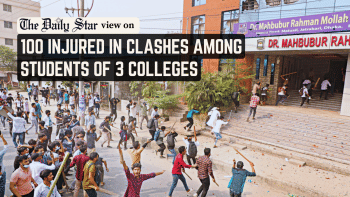
 For all latest news, follow The Daily Star's Google News channel.
For all latest news, follow The Daily Star's Google News channel. 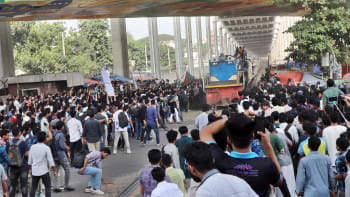

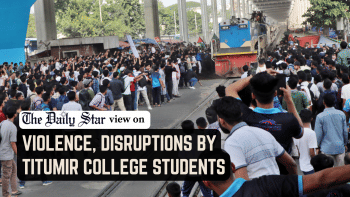




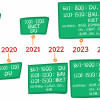
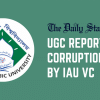



Comments